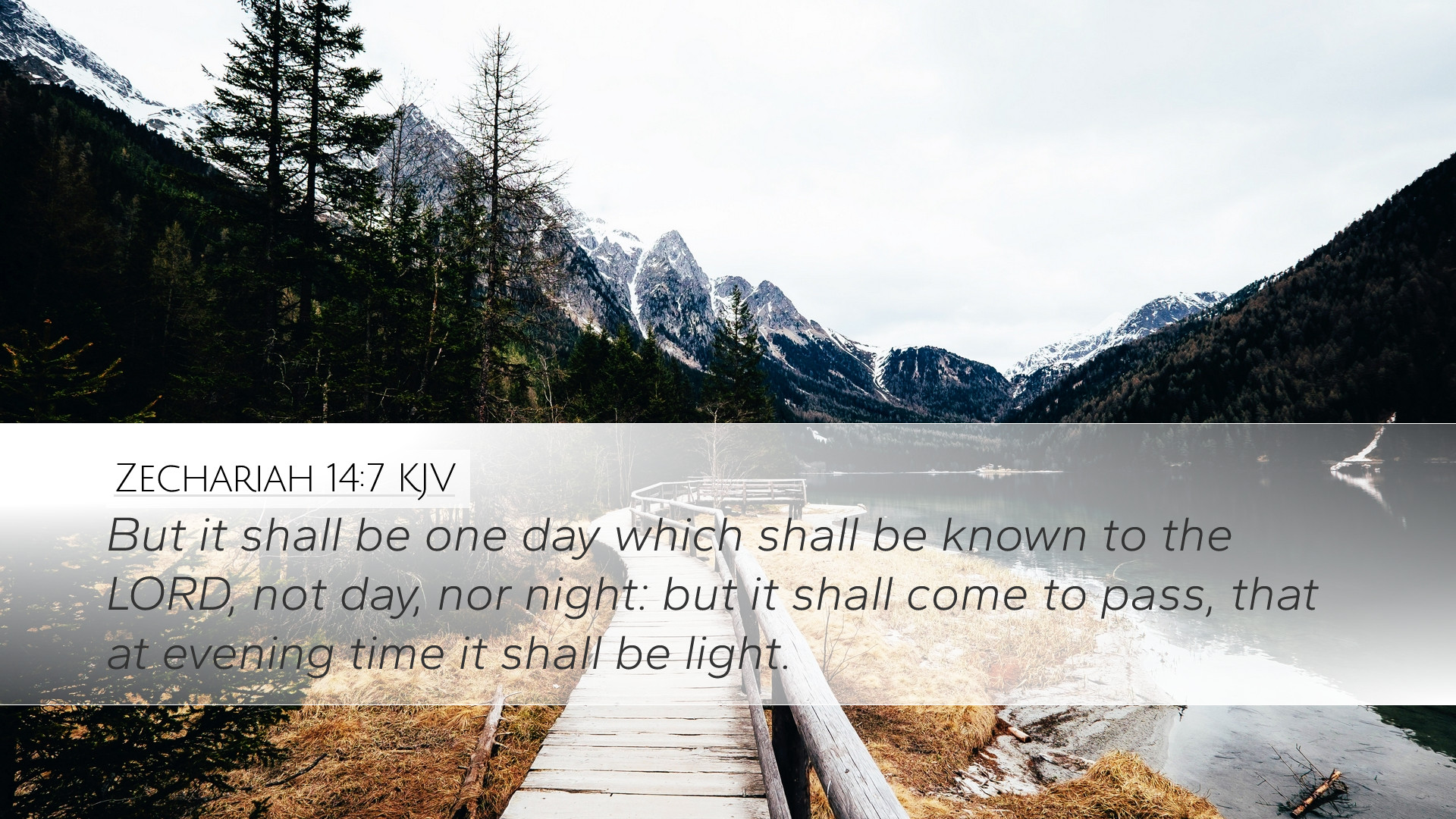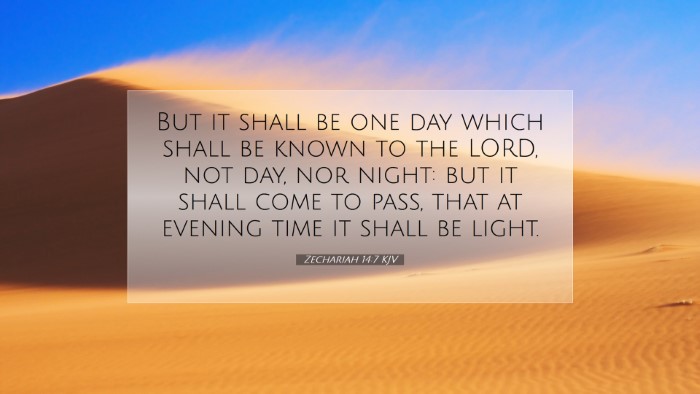Commentary on Zechariah 14:7
Bible Verse: "But it shall be one day which shall be known to the Lord, not day, nor night: but it shall come to pass, that at evening time it shall be light."
Introduction
Zechariah 14:7 offers a profound glimpse into the eschatological visions that characterize the latter chapters of Zechariah. As biblical commentators reflect upon this verse, the themes of divine intervention, hope, and the transformation of time and light emerge. In their analyses, Matthew Henry, Albert Barnes, and Adam Clarke provide rich insights into the significance of this prophecy, both in its immediate context and its application to future events.
Contextual Background
The Book of Zechariah is part of the Minor Prophets and addresses the restoration of Jerusalem and the Jewish people after the Babylonian exile. Chapter 14 specifically deals with the coming Day of the Lord, emphasizing judgment against the nations and the ultimate redemption of God's people.
Prophetic Vision
In Zechariah 14, the prophet envisions a climactic confrontation between God and the nations that oppose His will. The prophetic imagery conveys God’s sovereignty and the establishment of His kingdom. Verse 7 encapsulates this theme by suggesting a day that is distinctively different from typical human experience, transcending the normal cycles of day and night.
Exegetical Insights
- One Day Known to the Lord:
Matthew Henry points out that this 'one day' should be viewed through the lens of divine knowledge and control. It signifies a unique time ordained by God, highlighting His ultimate authority over time and events. This day represents a pivotal moment in history where God's purpose is realized.
- Not Day, Nor Night:
Albert Barnes elaborates on this phrase, indicating that the distinction between day and night dissolves. This transformation symbolizes God's presence with His people, bringing forth clarity and enlightenment that surpasses earthly understanding. The absence of natural ordering highlights the supernatural nature of God's work in the world.
- Evening Time It Shall Be Light:
Adam Clarke interprets this as an eschatological promise, where the darkness of evening signifies tribulation or judgment. However, the ensuing light represents hope, restoration, and the glory of the Lord shining forth. The contrast between evening and light portrays the triumph of good over evil and the fulfillment of God's redemptive plan.
Theological Implications
Zechariah's prophetic words invite deeper theological reflection regarding the nature of God’s kingdom. The implications of a singular, transformative day draw parallels to other biblical themes of judgment, grace, and redemption.
Divine Sovereignty
This verse emphasizes the sovereignty of God over time and history. It invites believers to trust in the Lord’s timing and His ultimate control over the events of the world, providing reassurance amid uncertainty and trials.
Hope and Restoration
The promise that light will emerge from a time of darkness serves as a powerful reminder of hope. In Christian theology, this foreshadows the coming of Christ, who declared Himself as the Light of the World (John 8:12). The transformation anticipated in Zechariah finds its ultimate fulfillment in the person and work of Jesus.
Understanding the Day of the Lord
The notion of the 'Day of the Lord' permeates scripture, and in Zechariah 14:7, it underscores God’s meticulous plan for His creation. The recognition that such a day is solely known to the Lord invites reflection on humanity’s understanding of divine timelines and the call to live in anticipation of His coming.
Conclusion
Zechariah 14:7 serves as a pivotal verse within the prophetic narrative, weaving together themes of divine knowledge, eschatological hope, and transformation. As pastors, students, and theologians reflect on this verse, they are reminded of the assurance of God’s presence in times of trouble and His promise of ultimate redemption. The insights from Matthew Henry, Albert Barnes, and Adam Clarke challenge readers to delve deeper into the unfathomable mysteries of God’s kingdom and inspire them to proclaim the light that breaks through even the darkest of times.
References
- Matthew Henry: Commentary on the Whole Bible
- Albert Barnes: Notes on the Old and New Testaments
- Adam Clarke: The Holy Bible with a Commentary and Critical Notes


